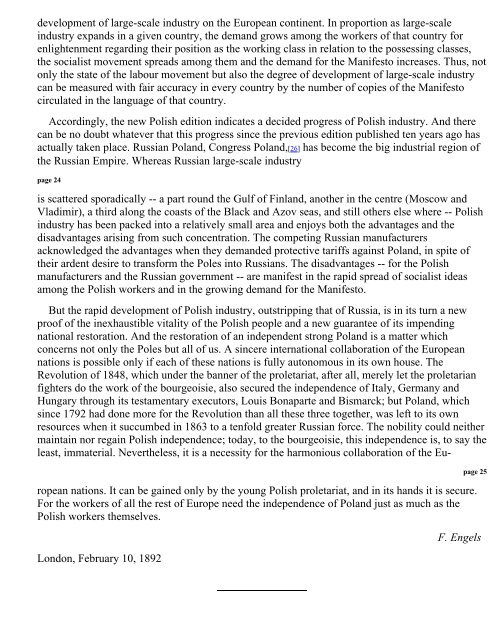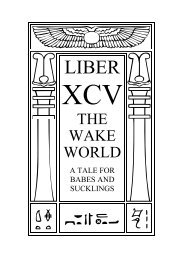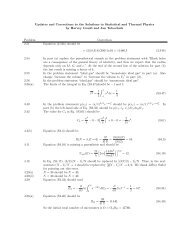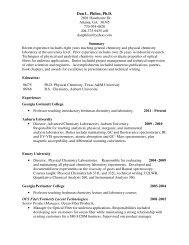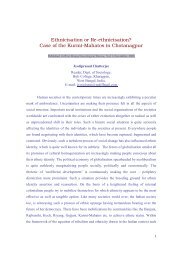Manifesto of the Communist Party - WebRing
Manifesto of the Communist Party - WebRing
Manifesto of the Communist Party - WebRing
You also want an ePaper? Increase the reach of your titles
YUMPU automatically turns print PDFs into web optimized ePapers that Google loves.
development <strong>of</strong> large-scale industry on <strong>the</strong> European continent. In proportion as large-scale<br />
industry expands in a given country, <strong>the</strong> demand grows among <strong>the</strong> workers <strong>of</strong> that country for<br />
enlightenment regarding <strong>the</strong>ir position as <strong>the</strong> working class in relation to <strong>the</strong> possessing classes,<br />
<strong>the</strong> socialist movement spreads among <strong>the</strong>m and <strong>the</strong> demand for <strong>the</strong> <strong>Manifesto</strong> increases. Thus, not<br />
only <strong>the</strong> state <strong>of</strong> <strong>the</strong> labour movement but also <strong>the</strong> degree <strong>of</strong> development <strong>of</strong> large-scale industry<br />
can be measured with fair accuracy in every country by <strong>the</strong> number <strong>of</strong> copies <strong>of</strong> <strong>the</strong> <strong>Manifesto</strong><br />
circulated in <strong>the</strong> language <strong>of</strong> that country.<br />
Accordingly, <strong>the</strong> new Polish edition indicates a decided progress <strong>of</strong> Polish industry. And <strong>the</strong>re<br />
can be no doubt whatever that this progress since <strong>the</strong> previous edition published ten years ago has<br />
actually taken place. Russian Poland, Congress Poland,[26] has become <strong>the</strong> big industrial region <strong>of</strong><br />
<strong>the</strong> Russian Empire. Whereas Russian large-scale industry<br />
page 24<br />
is scattered sporadically -- a part round <strong>the</strong> Gulf <strong>of</strong> Finland, ano<strong>the</strong>r in <strong>the</strong> centre (Moscow and<br />
Vladimir), a third along <strong>the</strong> coasts <strong>of</strong> <strong>the</strong> Black and Azov seas, and still o<strong>the</strong>rs else where -- Polish<br />
industry has been packed into a relatively small area and enjoys both <strong>the</strong> advantages and <strong>the</strong><br />
disadvantages arising from such concentration. The competing Russian manufacturers<br />
acknowledged <strong>the</strong> advantages when <strong>the</strong>y demanded protective tariffs against Poland, in spite <strong>of</strong><br />
<strong>the</strong>ir ardent desire to transform <strong>the</strong> Poles into Russians. The disadvantages -- for <strong>the</strong> Polish<br />
manufacturers and <strong>the</strong> Russian government -- are manifest in <strong>the</strong> rapid spread <strong>of</strong> socialist ideas<br />
among <strong>the</strong> Polish workers and in <strong>the</strong> growing demand for <strong>the</strong> <strong>Manifesto</strong>.<br />
But <strong>the</strong> rapid development <strong>of</strong> Polish industry, outstripping that <strong>of</strong> Russia, is in its turn a new<br />
pro<strong>of</strong> <strong>of</strong> <strong>the</strong> inexhaustible vitality <strong>of</strong> <strong>the</strong> Polish people and a new guarantee <strong>of</strong> its impending<br />
national restoration. And <strong>the</strong> restoration <strong>of</strong> an independent strong Poland is a matter which<br />
concerns not only <strong>the</strong> Poles but all <strong>of</strong> us. A sincere international collaboration <strong>of</strong> <strong>the</strong> European<br />
nations is possible only if each <strong>of</strong> <strong>the</strong>se nations is fully autonomous in its own house. The<br />
Revolution <strong>of</strong> 1848, which under <strong>the</strong> banner <strong>of</strong> <strong>the</strong> proletariat, after all, merely let <strong>the</strong> proletarian<br />
fighters do <strong>the</strong> work <strong>of</strong> <strong>the</strong> bourgeoisie, also secured <strong>the</strong> independence <strong>of</strong> Italy, Germany and<br />
Hungary through its testamentary executors, Louis Bonaparte and Bismarck; but Poland, which<br />
since 1792 had done more for <strong>the</strong> Revolution than all <strong>the</strong>se three toge<strong>the</strong>r, was left to its own<br />
resources when it succumbed in 1863 to a tenfold greater Russian force. The nobility could nei<strong>the</strong>r<br />
maintain nor regain Polish independence; today, to <strong>the</strong> bourgeoisie, this independence is, to say <strong>the</strong><br />
least, immaterial. Never<strong>the</strong>less, it is a necessity for <strong>the</strong> harmonious collaboration <strong>of</strong> <strong>the</strong> Eu-<br />
ropean nations. It can be gained only by <strong>the</strong> young Polish proletariat, and in its hands it is secure.<br />
For <strong>the</strong> workers <strong>of</strong> all <strong>the</strong> rest <strong>of</strong> Europe need <strong>the</strong> independence <strong>of</strong> Poland just as much as <strong>the</strong><br />
Polish workers <strong>the</strong>mselves.<br />
London, February 10, 1892<br />
page 25<br />
F. Engels


